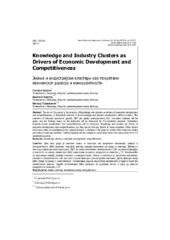Please use this identifier to cite or link to this item:
https://rfos.fon.bg.ac.rs/handle/123456789/1781Full metadata record
| DC Field | Value | Language |
|---|---|---|
| dc.creator | Jednak, Sandra | |
| dc.creator | Kragulj, Dragana | |
| dc.creator | Parežanin, Miloš | |
| dc.date.accessioned | 2023-05-12T11:13:54Z | - |
| dc.date.available | 2023-05-12T11:13:54Z | - |
| dc.date.issued | 2018 | |
| dc.identifier.issn | 0350-2120 | |
| dc.identifier.uri | https://rfos.fon.bg.ac.rs/handle/123456789/1781 | - |
| dc.description.abstract | Cilj ovog rada je analiza znanja i klastera kao pokretača ekonomskog razvoja i konkurentnosti. Biće prikazan teorijski pregled razvoja zasnovanog na znanju i klasteru. Daćemo i pregled indikatora (ekonomski rast, BDP po glavi stanovnika, nezaposlenost,GCI, indeksi inovacija), a rezultati na osnovu indikatora biće razmatrani za zemlje kandidate za članstvo u EU. Analiziraće se korelacija između razvoja klastera i konkurentnosti. Znanje i klasteri su pokretači ekonomskog razvoja i konkurentnosti, ali oni nisu ključni faktori u posmatranim zemljama. Drugi faktori imaju veći uticaj na razvoj i konkurentnost. Ograničenje rada je nedostatak empirijskih studija i podataka posmatranih zemalja. Buduće istraživanje biće usmereno na određeni sektor i jednu od zemalja kandidata za članstvo u EU. | sr |
| dc.description.abstract | The aim of this paper is the analysis of knowledge and clusters as drivers of economic development and competitiveness. A theoretical overview of the knowledge and clusters development will be provided. The overview of indicators (economic growth, GDP per capita, unemployment, GCI, Innovation Indexes) will be given, and the findings based on the indicators will be discussed for EU candidate countries. Correlation between cluster development and competitiveness will be analysed. Knowledge and clusters are drivers of economic development and competitiveness, but they are not the key factors in those countries. Other factors have more effect on development and competitiveness. Limitation of the paper is a lack of the empirical studies and data of observed countries. Further research will be oriented to a particular sector and one country from EU candidate countries. | en |
| dc.publisher | Univerzitet u Novom Sadu - Ekonomski fakultet, Subotica | |
| dc.rights | openAccess | |
| dc.rights.uri | https://creativecommons.org/licenses/by/4.0/ | |
| dc.source | Anali Ekonomskog fakulteta u Subotici | |
| dc.subject | znanje | sr |
| dc.subject | konkurentnost | sr |
| dc.subject | klaster | sr |
| dc.subject | ekonomski razvoj | sr |
| dc.subject | knowledge | en |
| dc.subject | economic development | en |
| dc.subject | competitiveness | en |
| dc.subject | clusters | en |
| dc.title | Znanje i industrijski klasteri kao pokretači ekonomskog razvoja i konkurentnosti | sr |
| dc.title | Knowledge and industry clusters as drivers of economic development and competitiveness | en |
| dc.type | article | |
| dc.rights.license | BY | |
| dc.citation.epage | 17 | |
| dc.citation.issue | 39 | |
| dc.citation.other | (39): 3-17 | |
| dc.citation.rank | M52 | |
| dc.citation.spage | 3 | |
| dc.identifier.doi | 10.5937/AnEkSub1839003J | |
| dc.identifier.fulltext | http://prototype2.rcub.bg.ac.rs/bitstream/id/467/1777.pdf | |
| dc.identifier.rcub | conv_143 | |
| dc.type.version | publishedVersion | |
| item.cerifentitytype | Publications | - |
| item.fulltext | With Fulltext | - |
| item.grantfulltext | open | - |
| item.openairecristype | http://purl.org/coar/resource_type/c_18cf | - |
| item.openairetype | article | - |
| Appears in Collections: | Radovi istraživača / Researchers’ publications | |
Page view(s)
16
checked on Dec 28, 2025
Download(s)
6
checked on Dec 28, 2025
Google ScholarTM
Check
Altmetric
This item is licensed under a Creative Commons License


